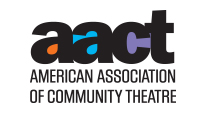Theatre Terms
 As a service to the theatre community, AACT provides over 1000 definitions of theatrical terms. Fully searchable, our glossary is helpful for technical staff, directors, actors, producers, or anyone wanting to better understand the inner workings of theatre.
As a service to the theatre community, AACT provides over 1000 definitions of theatrical terms. Fully searchable, our glossary is helpful for technical staff, directors, actors, producers, or anyone wanting to better understand the inner workings of theatre.
HOW TO SEARCH:
Click on a letter (A-Z) below to find terms beginning with the specified letter, OR enter a word in "Search for Term" OR search by entering a word in "Words in Definition." For example, entering the word "curtain" would display all words whose definition includes that word. (Note: If the A-Z or word search has been activated, it must be reset before using "Search for Term" or "Words in Definition." To reset the A-Z search: Click Here)
| Term | Definition | Link |
|---|---|---|
| REPERTORY | A form of organization, usually with a permanent company of actors, where each production has a run of limited length. At any time, there is normally one production in performance, another in rehearsal and several others in varying degrees of planning. | |
| REPRESENTATIVE | The individual or company representing the interests of the playwright, who licenses his or her work for production. The representative's responsibilities include enforcing copyright law (prohibiting changes to the show, monitoring unlicensed productions), and securing an appropriate royalty for the author. | |
| RESISTANCE DIMMER | A now obsolete method of dimming which decreases the current available to the load by introducing a variable resistance between supply and load. The excess current is converted into heat. Based around a rheostat. | |
| RESTRICTED | Performance rights to a play may not be available if a play is running on or off-Broadway, or is on national tour. Or a professional theater in your area may have secured rights to produce the play, barring all other local productions until its run has closed. The availability of a play can change from day to day, which is why restrictions don't appear in most play catalogs. Restrictions exist because professional producers and touring groups pay much higher royalties than nonprofessionals, thus guaranteeing them exclusivity and a certain amount of freedom from competition. As a rule, all productions in New York and Los Angeles must be cleared, so allow for extra time if your theater is located in these areas. Other major cities like Chicago, Seattle or San Francisco may require additional clearance as well. | |
| RESTRICTIONS | ||
| RETROFIT | A modification that can be made to an existing piece of equipment after purchase to bring it up to date. | |
| RETURN | 1) Flats joined to the DS edge of flats of a set or unit that "return" into the wings. They help mask and also keep the DS edge of a set from looking raw. 2) A financial report given to theatre management staff by the box office manager on a daily or weekly basis setting out the takings for performances. 3) Route for an auxiliary signal back into a sound mixer. | Auxiliary |
| REVEAL | A return which is at right angles to a flat, and suggests the depth of a window, wall, doorway etc. | |
| REVERB | (Reverberation) 1) Effect which may be added to sound effects during recording or to a voice during performance. Sustains the sound longer than normal, as if the sound was reverberating around a large building (e.g. cathedral). 2) Persistence of sound after the source has ceased. | |
| REVOLVE | A turntable built into the stage floor on which scenery can be set and then driven into view. Can be electrically chain driven, or manually pushed into position. A revolve can also be built on top of an existing stage. | |
| REVUE |
A series of songs, dances, and sketches, assembled to present a theme, but without a plot or through storyline. Examples include Cats, Ain't Misbehavin', You're A Good Man Charlie Brown, and I Love You, You're Perfect, Now Change. |
|
| RF | Radio Frequency | |
| RIAA | Record Industry Association of America. The standard equalization to be applied to a signal from a record deck pick-up. Phono pre-amps have RIAA circuitry built-in. | |
| RIG | 1) The construction or arrangement of lighting equipment for a particular production. (noun) 2) Installing lighting, sound equipment and scenery etc for a particular show. (verb) | |
| RIGGING | Collectively, the ropes, wires, blocks, pulleys, pins, counterweights, and other pieces of equipment needed in the manipulation of scenery and stage drapery. A simple counterweight system is based on the principle of establishing a balanced set of weights that allow a stagehand to raise and lower various loads with minimal effort. Complete rigging systems consist of one or more counterweight sets. Each is comprised of a pipe batten suspended from lifting cables which pass over loft block sheaves, then over the head block at one side of the stage and down to the counterweight arbor. | |
| RIGHT CENTER or CENTER RIGHT | A stage position or area just to the right (the audience's left) of the exact center of the stage. | |
| RIGHTS | The author, via the representative or publisher, confers on a theater company the right to produce a staged production as set forth in the contract signed by the producing company. | |
| RISER | 1) Any platform on stage. For instance, the series of platforms for choral presentations are called choral risers, the rostrum on which a drum kit and drummer is positioned is the drum riser. 2) The vertical portion of a step which gives a set of treads its height. | |
| ROAD MANAGER (ROADIE) | Touring technician with one night shows, particularly music groups. Large groups will have a roadie in charge of a particular instrument or set of instruments who is responsible for the correct unloading and setting up (tuning etc) of the instruments before the artists arrive onstage for the sound check. | |
| ROAD SHOW | A touring production. |




